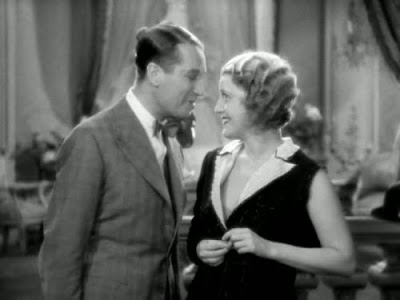I’ve never met you, yet never doubt, dear;
I can’t forget you, I’ve thought you out, dear.
I know your profile and I know the way you kiss,
just the things I miss on a night like this.
If dreams are made of imagination
I’m not afraid of my own creation.
With all my heart, my heart is here for you to take.
Why should I quake? I’m not awake.
Isn’t it romantic?
Music in the night
Film writer Mark Cousins chose the following words from Arthur Koestler to preface his book ‘The Story of Film’: “The measure of an artist’s originality, put in its simplest terms, is the extent to which his selective emphasis deviates from the conventional norm and establishes new standards of relevance. All great innovations which inaugurate a new era, movement or school, consist in sudden shifts of a previously neglected aspect of experience, some blacked out range of the existential spectrum. The decisive turning points in the history of every art form… uncover what has already been there; they are ‘revolutionary’, that is destructive and constructive, they compel us to revalue our values and impose new sets of rules on the eternal game.” [1]
Why repeat these thoughts in a review of Rouben Mamoulian’s musical film Love Me Tonight? Two reasons. Firstly, Koestler while not addressing cinema directly, in crystallizing the essence of artistic creativity, brings into focus the nature of film as art: isolating an aspect of experience within the cinematic frame. Secondly, because Mamoulian’s achievement in this early talkie establishes a new standard of relevance. The British film critic Geoff Andrew in a capsule review of Love Me Tonight describes the ‘Mamoulian touch’ as an: “unforced sense of sophisticated fun co-existing with real cinematic invention” [2].
David Parkinson in his book ‘The Rough Guide To Film Musicals’ in the entry for Love Me Tonight writes:
“Mamoulian insisted that each of the nine distinctively staged musical numbers should be factored into the screenplay, so that they not only advanced the plot and developed the characters, but also subverted musical convention by forming bridges between the dialogue and the lyrics that were as subtly rhythmic as the cutting and the movement of the cast and camera. The scale of Mamoulian’s achievement is evident from the first sixteen minutes, which effortlessly establish the key themes of town/country, night/day, rich/poor, old/new and two hearts becoming one. The director drew on his 1927 stage production of Porgy And Bess for the opening ‘symphony of noises’ sequence, in which the sounds of pavement-sweeping, boot-making, cobblestone-tapping and bell-ringing create an audio equivalent of the “city symphony” montages pioneered by the likes of Walter Ruttmann and Dziga Vertov… He also played mischievous games with the film speed and the sound effects, and reveled in the risqué dialogue, much of it involving Myrna Loy’s man-eating Countess Valentine. However, the music remains the animating force, whether it’s Jeanette singing “Lover” to her horse, Maurice serenading her with “Mimi” or the titular duet which ends with a saucy split-screen shot of Maurice and Jeanette’s heads on neighboring pillows. Moreover, in deference to the duality that dominates Hollywood musicals, Mamoulian used mirror songs to unify the action, with “Maurice Enters The Castle” reprising “How Are You?” and his disguise as a baron being exposed in the passed-along tune, “The Son Of A Gun Is Nothing But A Tailor”, which culminates in a top shot that anticipated Busby Berkeley’s famous camera angle, as the footmen scurry off in star formation to spread the gossip. The picture’s happy ending confounds expectations, with Mamoulian even out-montaging Sergei Eisenstein as Jeanette reverses the romantic roles by charging after the departing Maurice’s train on her trusty steed… and although it did only moderate business at the box office and was overlooked by the Academy, it has since been acknowledged as a musical masterclass.”
Mamoulian’s particular innovation in Love Me Tonight, achieved despite stubborn resistance from technical experts, was to use pre-recorded musical accompaniment played to the actors during the recording of certain scenes, elevating the action to rhythmic movement. There is a wonderful scene where Maurice Chevalier is searching for his love in her large mansion, with each bodily movement a delirious delight as he bounds up and down stairs, and opens massive observatory doors to take peeks at the rooms within.
It is Mamoulian’s picture, but it is the charm and sexy elegance of Jeannette McDonald that melts the heart. Her presence in a scene brightens proceedings like the sun warming the soul on a spring morning.
Love Me Tonight (Paramount Pictures 1932)
Director: Rouben Mamoulian
Cast
Maurice Chevalier (Maurice Courtelin)
Jeanette MacDonald (Princess Jeanette)
Charlie Ruggles (Vicomte Gilbert de Vareze)
Charles Butterworth (Count de Savignac)
Myrna Loy (Countess Valentine)
C. Aubrey Smith (The Duke)
Awards
Selected for Registry by the National Film Preservation Board (1990)
[1] Arthur Koestler, ‘The Act of Creation’, London Hutchinson 1964
[2] Steven J. Schneider, ‘1001 Movies You Must See Before You Die’, New Burlington Books, London, 2005, p. 100









